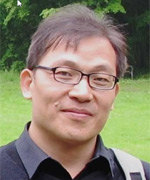
Frank O'Hara
弗兰克-奥哈拉
  Frank O'Hara (1926-1966) was an American poet and art critic, and he was regarded as the leading figure in the New York School, writing in a remarkable colloquial style in everyday language. Frank O'Hara (1926-1966) was an American poet and art critic, and he was regarded as the leading figure in the New York School, writing in a remarkable colloquial style in everyday language.
弗兰克-奥哈拉(1926-1966),美国诗人与艺术批评家,被认为是美国纽约派的核心人物,以日常口语写出了令人赞叹的风格独特的先锋诗歌。
|

|

译者
Translator
得一忘二
Jinghua Fan
  得一忘二,60后诗人、译者。他以中英文写诗,出版了多部翻译作品和诗集,诗作发表于中国大陆、台湾、新加坡以及美国等杂志与文选,曾获奖并多次受邀出席国际诗歌节。他目前定居新加坡,在大学任教。 得一忘二,60后诗人、译者。他以中英文写诗,出版了多部翻译作品和诗集,诗作发表于中国大陆、台湾、新加坡以及美国等杂志与文选,曾获奖并多次受邀出席国际诗歌节。他目前定居新加坡,在大学任教。
Fan Jinghua is a bilingual poet and translator. His poems have been published in literary magazines and anthologies in Mainland China, Taiwan, Singapore and USA. He has been invited to several international poetry festivals and has read his poems in different occasions, and he has been awarded prizes for his poems and translations. Jinghua works as a university lecturer and lives in Singapore.
|
The banal machines are exposing themselves
on nearby hillocks of arrested color: why
if we are the anthropologist's canapé
should this upset the autumn afternoon?
It is because you are silent. Speak, if
speech is not embarrassed by your attention
to the scenery! in languages more livid than
vomit on Sunday after wafer and prayer.
What is the poet for, if not to scream
himself into a hernia of admiration for all
paradoxical integuments: the kiss, the
bomb, cathedrals and the zeppelin anchored
to the hill of dreams? Oh be not silent
on this distressing holiday whose week
has been a chute of sand down which no
factories or castles tumbled: only my
petulant two-fisted heart. You, dear poet,
who addressed yourself to flowers, Electra,
and photographs on less painful occasions,
must save me from the void's external noise.
1952
|
|
秋色深锁的山丘上,机器
暴露出自己的俗不可耐:假若
我们只是人类学家的开胃小饼,
这秋日午后为什么还会受到影响?
都因为你沉默不语。说话呀,
就当你没有把心思太集中于风景
而羞于言语!说吧,哪怕你的语言
比周日圣饼与祈祷后的呕吐物更苍白。
诗人能做什么?无非是要尖叫,
让自己获得似是而非的幌子下
所有痛风似的敬仰:那亲吻,
那爆棚,大教堂以及停泊在
梦想之山上的飞艇。哦,在这郁闷的
假日,你不要沉默不语,这个星期
已经是一条流沙的滑道,没有
工厂或城堡沿途塌陷:有的只是
我这暴躁好斗的心。而你,亲爱的诗人,
你曾专注于花朵,恋父的女儿,
还有并不怎么痛苦的场合的照片,
你必须救我远离这周遭的虚空的噪音。
1952年
|
I can't believe there's not
another world where we will sit
and read new poems to each other
high on a mountain in the wind.
You can be Tu Fu, I'll be Po Chü-i
and the Monkey Lady'll be in the moon,
smiling at our ill-fitting heads
as we watch snow settle on a twig.
Or shall we be really gone? This
is not the grass I saw in my youth!
and if the moon, when it rises
tonight, is empty —a bad sign,
meaning “You go, like the blossoms.”
1954
|
|
我不相信没有另一个
世界,我们可以坐而论
诗,在山巅的风中
对彼此读读新写的诗。
你可以是杜甫,我就做白居易,
而猿猴夫人会在月宫,
我们仰头看雪花积聚在树枝,
她看着我们头大身小而微笑。
或者我们真该走了?这不是
我年轻时看到的如茵绿草!
如果月亮还会在今夜升起,
也只是一轮空洞——这不吉之兆,
意味着“你之离去,犹如落花”。
1954
|







